Recent General Posts
Reclaim Your Space, Your Peace with SERVPRO® of Denton
7/5/2023 (Permalink)
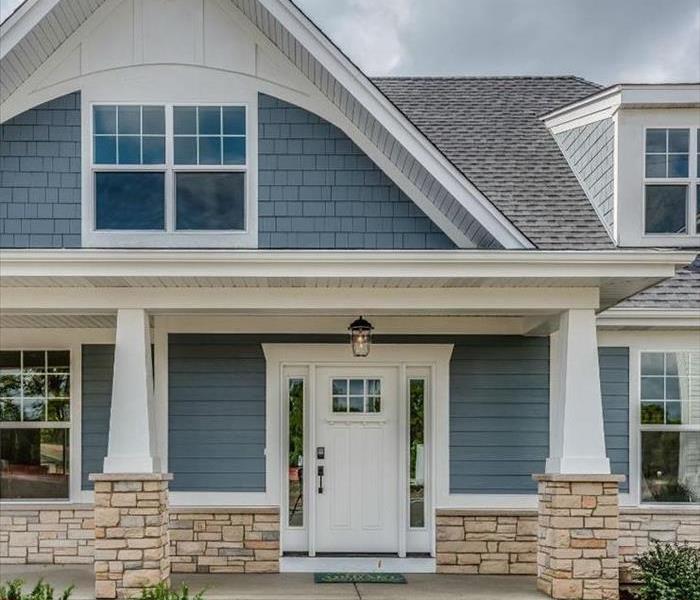 Restoring your home to its former glory, SERVPRO® of Denton is your 24/7 beacon of hope. We're committed to helping you reclaim not just your property
Restoring your home to its former glory, SERVPRO® of Denton is your 24/7 beacon of hope. We're committed to helping you reclaim not just your property
Your home is your sanctuary, a personal retreat providing peace and security. When disaster strikes, however, it can disrupt that tranquility. SERVPRO® of Denton is committed to helping restore not just your property, but also your peace of mind.
Fire, water, mold—each poses unique challenges. SERVPRO® of Denton, with its 24/7 availability, is always ready to provide efficient, high-quality restoration services for these disasters.
Water damage, whether from flooding or a broken pipe, can wreak havoc on your home. We offer water removal, dehumidification, and drying services to restore your property to pre-damage condition. Our team also performs necessary structural repairs, mitigating water's lasting effects.
Fire, a particularly destructive force, can cause extensive damage. SERVPRO® of Denton's fire damage restoration services include soot, smoke, and odor removal, along with structural cleaning and restoration, ensuring your home is safe and comfortable once more.
Mold is a silent intruder, often going unnoticed until it becomes a significant problem. Our mold remediation services include identifying the source of the mold, containing its spread, removing mold-infested materials, and cleaning the area to prevent future growth.
Beyond these, we provide storm damage cleanup, biohazard cleanup, and carpet & upholstery cleaning, among other cleaning services, to ensure your home is in its best state.
Restoration isn't merely about fixing a problem. It's about rebuilding your life and reclaiming your peace. SERVPRO® of Denton doesn’t just restore homes; we restore peace of mind. Our experts are on standby, ready to provide you the services you need, any time of the day or night.
Trust SERVPRO® of Denton to restore your home and serenity. Because, when it comes to restoring peace, every second counts.
Kitchen Fire Prevention Safety Tips
2/25/2022 (Permalink)
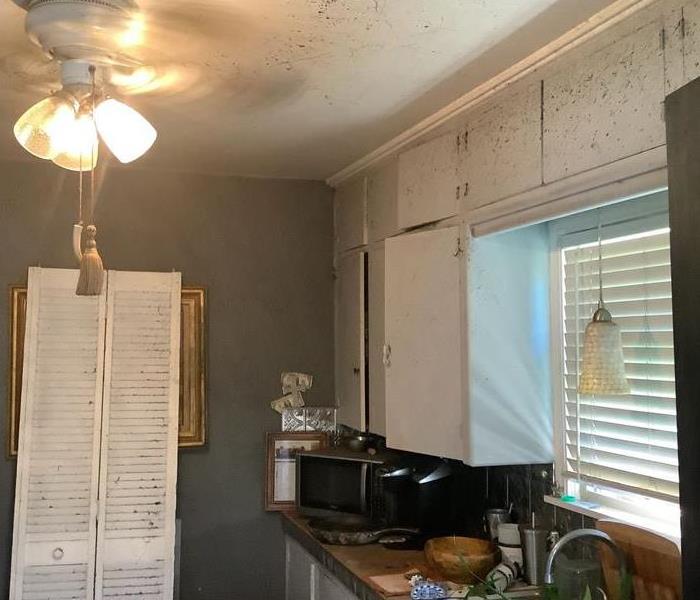 When you experience a kitchen fire, call the experts at SERVPRO® of Denton. Our fire restoration experts will make it "Like it never even happened."
When you experience a kitchen fire, call the experts at SERVPRO® of Denton. Our fire restoration experts will make it "Like it never even happened."
According to ameriburn.org, the theme for 2022 is, Burning Issues in the Kitchen. Cooking is the number one cause of residential fires in the United States. In fact, the American Burn Association reports 47% of all home fires are caused by cooking.
Below are some tips to keep you and your family safe while cooking in the kitchen.
• The best time to cook is when you are wide awake.
• Always wipe the stove, oven, and exhaust fan after cooking to prevent grease buildup.
• Turn pot or pan handles toward the back of the stove.
• When heating food in the microwave, use microwave-safe cookware that allows steam to escape.
• When frying, use a pan, lid, or splash guard to prevent grease splatter.
• If you are simmering, baking, roasting, or boiling food, check it regularly. Remain in the home while cooking and use a timer to remind you to check on your food.
And if you ever have a fire in your kitchen, SERVPRO® of Denton is here to help restore your home to preloss condition in most cases.
First Steps to Take in an Emergency
2/26/2021 (Permalink)
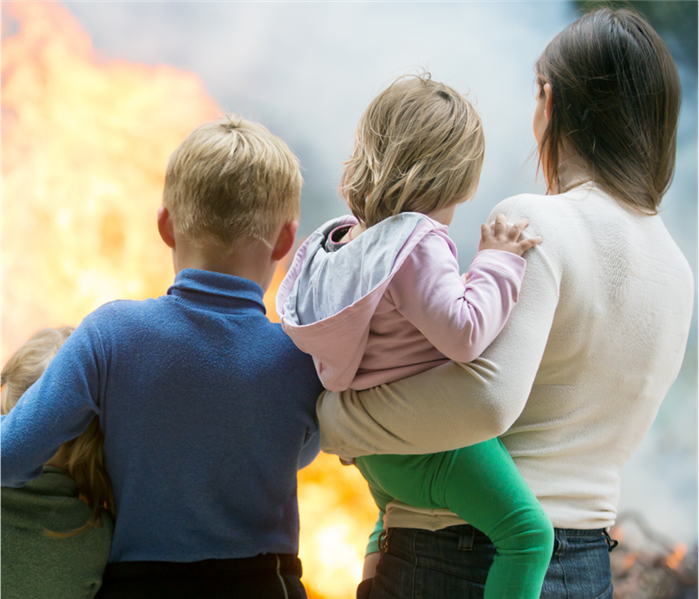 When the unforeseen happens, it's good to have a plan in place.
When the unforeseen happens, it's good to have a plan in place.
Flooding from a burst pipe. A grease or electrical fire. A natural disaster.
You hope it never happens to you, but what if it does? What do you do first, and when does your neighborhood SERVPRO team come into play?
First And Foremost
Do not panic. Stay calm and remember that safety is the most critical factor in these situations. Belongings can be replaced, but people cannot.
Tell everyone to calmly evacuate the premises to a safe distance, obtaining only essential belongings, and only if safely accessible upon evacuation. Once outside, make sure everyone on site is safe and accounted for.
If a fire or a collapsing structure, or if someone on-site needs urgent medical attention, make 9-1-1 your first call. After that, call your insurance agent.
In the event of a flood, try and move more important belongings to higher places or even higher stories of a multi-story home or commercial property. However, if floodwaters are moving fast enough, they can take you off your feet, so assess the severity of the flood to determine how urgently you need to evacuate.
What To Document
Write down any and every detail you can recall, and remember that no detail is too insignificant. Note anything that seems damaged or out of order. Any further information pertaining to a potential cause is essential.
And once it is safe to do so, don’t forget to capture visuals for your insurance agent. They will usually advise you on when is the right time to do this. Take photos, or even shoot video, on your smartphone if you can.
Contacting SERVPRO
After ensuring everyone is safely evacuated and contacting your insurance agent (and emergency services if a fire dictates it), call your local SERVPRO experts at (940) 514-8968.
Our phones are manned 24/7, and we can advise on how to proceed, thanks to our free consultation policy. If it’s a small job you can handle yourself, that’s great! If not, there’s never been a job too tough for our team to tackle.
Save our phone number, and remember that we’ve got your back!
How Heat Can Damage Your Property
8/17/2020 (Permalink)
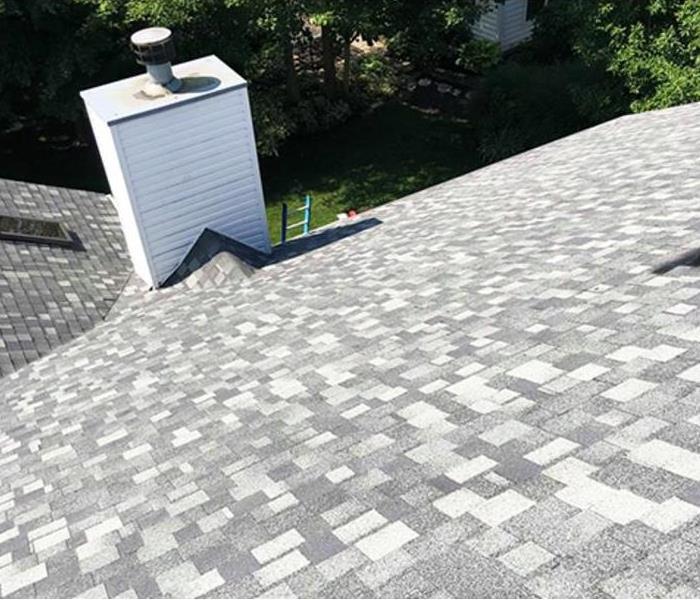 Heat and sun damage can potentially cause both aesthetic and structural issues.
Heat and sun damage can potentially cause both aesthetic and structural issues.
Summer in North Texas can be intense to say the least. With temperatures consistently breaking 100° Fahrenheit, it is important to understand how high temperatures may affect your property. Here are the some of the various parts of your property that heat can cause damage to:
Paint. Excessive heat can cause damage to the paint on the exterior of your property. Be sure to check your exterior paint for bubbling, chipping, and flaking. This is not just a cosmetic issue. Rather, this type of damage can create an opening for moisture. Uninvited moisture could even allow mold to begin forming in your home. A quick check during hot summer months could save you a great deal of hassle (and money) down the road.
Roof. Sun exposure can cause a number of different types of damage to your roof, which could affect both the lifespan, performance, and durability of your roof. The coating that protects your roofing materials may be dried out by the sun, which may cause the coating to crack or break completely, leaving the top of your house exposed to the elements. The bleaching of your roof could also occur, though this is largely an aesthetic problem. Depending on what type of material your roof is made of, it may be more susceptible to different types of heat damage, so you may want to explore this topic further so you know what warning signs to be on the lookout for.
Foundation. Soil acts as a support system to your foundation. When your soil has a lack of moisture, it begins to shrink and pull away from your foundation. This creates space for movement and settlement, which can cause cracks in your foundation. Soil shrinkage can be caused by periods of excessive heat, as the sun dries out the soil. Be sure to regularly assess the amount of moisture in your soil in the summer months.
Pipes. Water use typically increases during the summer months, which places extra pressure on your pipes. If your foundation shifts even slightly, your water lines could disconnect or even rupture due to movement. You can regularly check for leaks yourself, and have a plumber regularly check the caulking and sealing around your pipes.
Try to beat the heat as best you can, but remember to care for the well-being of your property too! If you do end up needing any repairs to your property, be sure to give us a call at (940)566-2277 or submit an information form. Hot or cold, we are here to help!
The Different Types of Weather Alerts
8/11/2020 (Permalink)
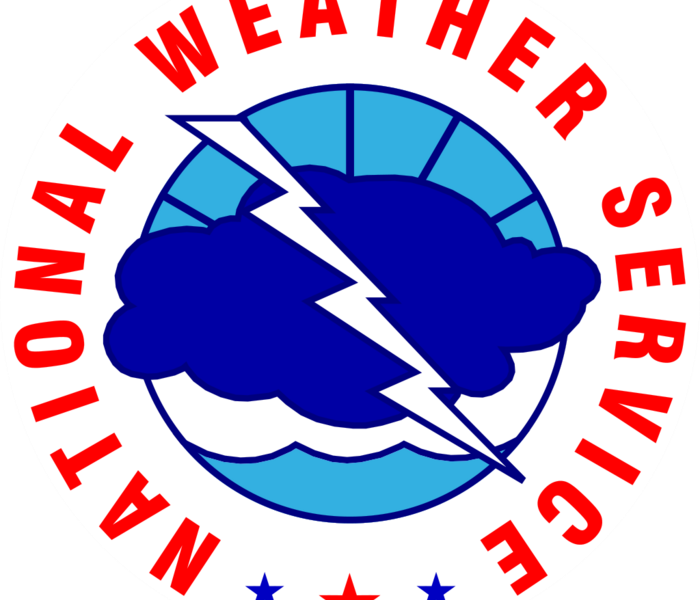 Official logo of the National Weather Service, which has been providing weather forecasts and alerts since 1870.
Official logo of the National Weather Service, which has been providing weather forecasts and alerts since 1870.
There are several types of severe weather that impact Denton and the rest of north Texas that can cause the National Weather Service (NWS) to issue an alert. Alerts are issued in order to make the population of the impacted area aware of the potential dangers that they could be facing, and hopefully allow them time to adequately prepare for the impending acclimate conditions. There are several different types of alerts that can issued, varying in degree by the potential risk associated with that type of weather. The three most common classes of alerts issued by the NWS are watches, warnings, and advisories. Watches, warnings, and advisories can be triggered by a number of different types of weather phenomena, such as floods, thunderstorms, tornadoes, and even excessive heat. Below are the definitions of each alert to help you better understand the distinctions between them:
A watch is issued when there is chance this condition will occur, and generally covers a larger geographic area over a longer period of time.
A warning means that the weather is already occurring or has a high likelihood of occurring in the near future, and advises the population of the impacted area to take proper protective measures.
Advisories are issued when a certain type of weather has a fair chance of occurring, but advisories are typically used for less severe types of weather conditions (i.e. the issuance of a wind advisory rather than a high wind warning).
Now that you understand the differences between watches, warnings, and advisories here are the criteria for some of the issues that are most commonly issued for our region by the governing NWS office, which is located in Norman, OK:
Freezing Rain/ Drizzle Advisory Issued when freezing rain is predicted to cause travel problems, but not exceed an accumulation of ¼”.
Ice Storm Warning Issued when freezing rain is expected to produce ice accumulations of 1/4” or greater, and significantly disrupt traffic and utilities.
Severe Thunderstorm Warning This type of alert occurs when there is a reliable report that a thunderstorm is producing or will soon produce gusts of wind of 58 mph or greater, structural wind damage, and/or hail with a diameter of 1” or greater.
Flash Flood Watch Issued when an area is facing the possibility of flash flooding within the next 36 hours.
Flash Flood Warning Issued when a flash flood is predicted to occur in the next future, generally within the next 1 to 3 hours.
Hopefully knowing the difference between these weather alerts can help you adjust your expectations and better prepare for the occurrence of acclimate weather. SERVPRO of Denton is here to help you restore your home or business in the event that disaster does strike. Whether it was water damage caused by a flood or you are needing roof repairs after a hail storm, we will make it "Like it never even happened." Give us a call at (940)566-2277 or submit an information form and we will follow-up with you!
Sources:
https://www.weather.gov/oun/spotter-wwa-definitions
Staying Safe While Boating
6/30/2020 (Permalink)
 Water enthusiasts need to be aware of the electrical and carbon monoxide hazards that surround them.
Water enthusiasts need to be aware of the electrical and carbon monoxide hazards that surround them.
Summer often is the time for boating and leisure activities on the water. But water enthusiasts need to be aware of the electrical and carbon monoxide hazards that surround them.
Electrical safety:
- Never swim near a boat, marina or launch ramp due to residual electrical current that could be flowing in the area.
- Make sure to maintain your boat.
- Only use electrical cords intended for marine usage.
- Know where the breakers are on the boat and on shore.
Carbon Monoxide Safety:
- Make sure to maintain your engine to prevent excess carbon monoxide.
- Proper ventilation for the engine and generator exhaust vents. They must not be blocked.
- If you suspect that you've come in contact with high levels of carbon monoxide get fresh air immediately. Symptoms of CO poisoning include headache, fatigue, confusion, dizziness, nausea, or seizures.
- Do not swim near the boats exhausts.
- Make sure to install CO alarms on your boat.
Source: https://www.nfpa.org/~/media/files/public-education/resources/safety-tip-sheets/boatingsafetytips.pdf
Vacation Planning? Prepare You Home!
5/26/2020 (Permalink)
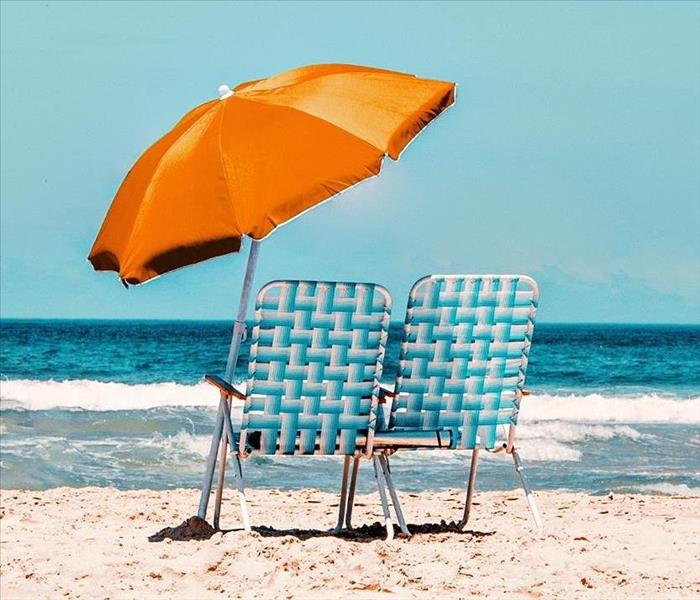 With these tips, you can relax at the beach and not have to worry about your home or property.
With these tips, you can relax at the beach and not have to worry about your home or property.
If you are planning a vacation this summer here's some tips for you to keep your home safe and damage free.
Make Arrangements with Emergency Contact
- Close friend or neighbor
- Provide emergency contacts
- Turn on porch lights or garage lights
- Collect mail or flyers: burglars look for homes with overflowing mail, flyers, or newspapers
- Leave written information on alarm codes
Take Plumbing and Electric Precautions
- Shut off gas and water at the meter, supply tank or appliances
- Turn off the water valves to washing machines, sinks, and the dishwasher
- Unplug electronics to cut down on any possible shortages
- Check your smoke detectors to ensure they are working properly
- Adjust your thermostat to 75-80 degrees.
Following these tips will help your home to stay safe while you are away.
Celebrating National Police Week in Denton
5/15/2020 (Permalink)
 SERVPRO of Denton recently brought pizzas to the Denton Police Department in honor of National Police Week.
SERVPRO of Denton recently brought pizzas to the Denton Police Department in honor of National Police Week.
National Police Week is celebrated every May. The week was nationally signed into law by President John F. Kennedy in 1962, when he proclaimed May 15 as National Peace Officers Memorial Day and the calendar week in which May 15 falls, as National Police Week. The week pays special recognition to those police officers who lose their lives in the line of duty.
To honor this week, SERVPRO of Denton delivered pizzas to the Denton Police Department to thank them for all that they do not only during this week in May but all year round.
Prevent Grilling Fires This Summer
5/2/2020 (Permalink)
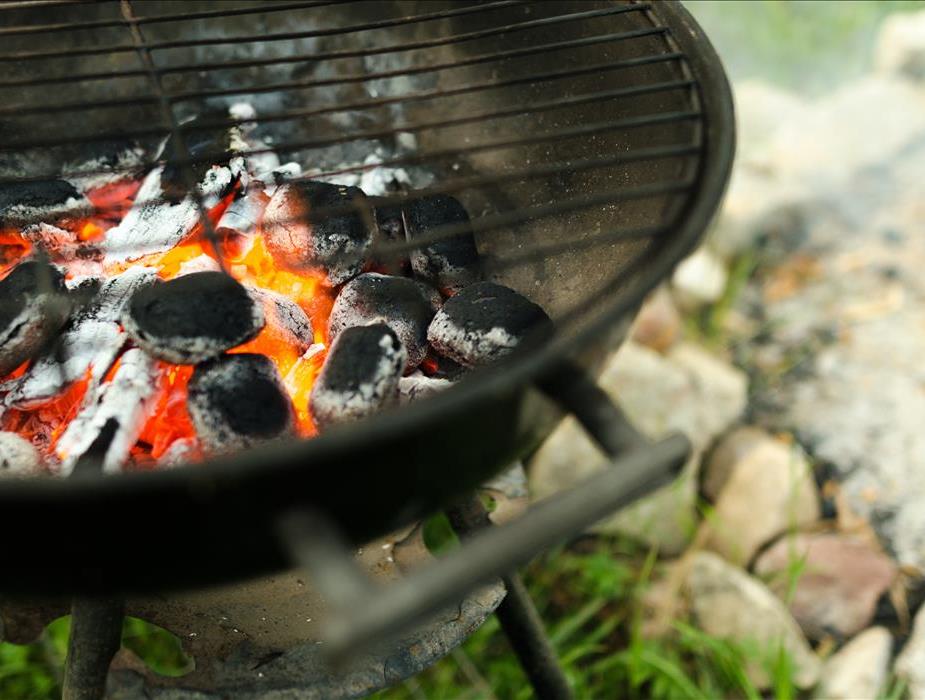 An unclean grill is the cause of one-fourth of all grilling fires.
An unclean grill is the cause of one-fourth of all grilling fires.
With summer on the horizon, we know that most people gravitate towards their gas and charcoal grills, but safety is important for not only the person grilling but also for the structure around the open flame. This is because grills, hibachis or barbecues were involved in an average of 10,600 home fires per year between 2014-2018, according to the National Fire Protection Association (NFPA).
SERVPRO of Denton wants to offer these tips to you for a safe grilling season.
- Only use your grill outside and keep it 3-feet away from any structure.
- Keep a 3-feet safe zone, which keeps kids and pets safe.
- Make sure your gas grill is open before lighting it.
- Always keep an eye on lit grills, fire pits or torches.
- Clean your grill after each use.
- Place coals in a metal bin with a lid once they are cool.
We wish you a safe and happy grilling season!
Restoration and Insurance
8/15/2019 (Permalink)
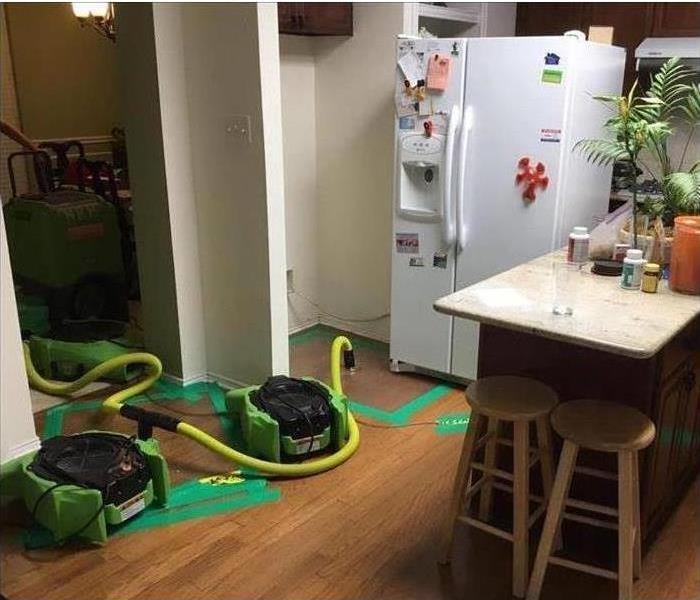 Water damage has taken its toll on this kitchen.
Water damage has taken its toll on this kitchen.
In a matter of minutes, a natural disaster can cause damage to your home that could require months of restoration work. Once the initial shock settles, many property owners start to feel overwhelmed. How will you recover from this? Where is the money to address the damages? Does your family need to live somewhere else temporarily? A good restoration company can guide you to the answers, working alongside you to collaborate with and understand your insurance provider. Here are the foundational need-to-knows regarding homeowners insurance.
The Importance of Insurance
If you’re paying for your home with a mortgage, you’re likely required to have homeowners insurance. This insurance protects the financial interests of both you and your mortgage lender. If your home is damaged or even destroyed in a natural or man-made disaster, you would, unfortunately, still be responsible for paying for your home’s mortgage. Meanwhile, you could be without a place to live, struggling to pay for temporary accommodations. Having homeowners insurance helps with that.
Know Your Coverage Before Disaster Hits
The time to prepare for a disaster is now, before one hits. You want to be confident about exactly what your policy covers. Basic policies usually cover damage caused by lightning strikes, fire, hail and windstorms. Other natural disasters, like flooding or earthquakes, are often not included. If you live in an area that’s considered a flood zone, or experience frequent tornadoes, you’ll want to make sure your coverage includes those potential damages. The same goes for water damage that could occur from broken pipes or other components in your home.
A great habit to develop is reviewing your insurance policy each year. Talk with your insurance agent to make sure you’re properly covered with limits that realistically cover potential losses. If your insurance limits aren’t enough to cover the full replacement of your home or your belongings, you may want to adjust your coverage. You should also know and be comfortable with your deductible. A deductible is the amount you’re responsible to pay in the event of a claim, and it usually needs to be paid before insurance benefits apply.
What to do After Damage Occurs
Once the danger has passed, the first steps toward restoring your home begin. Some damage, like the results of a fire or flood, will be immediately noticeable. However, not all damage is visible. When assessing your home, walk around its exterior and look for:
- Roof damage, including torn or missing shingles
- Fallen trees or limbs
- Missing shutters
- Damage to your gutters or downspouts
- Broken windows
- Cracks in siding or foundation
Inside your home, look for:
- Water leaks from your attic, ceiling or walls
- Cracks in the walls
- Problems closing your doors or windows
- Flooding within your home, including basement
Your first inclination may be to immediately start cleaning up on your own. But it’s essential to call your insurance agent and begin the claims process first. Then, take photos of the damage as evidence.
Unless you’ve dealt with damage to your home before, you may not know who to contact for cleanup and restoration. When in doubt, your insurer should be able to refer you to a reputable, experienced company in your area. When the restoration team arrives, they, too, will document the damage before beginning their mitigation work. Mitigation helps prevent additional damage from occurring. In the case of a flood, this type of work would include using air movers and dehumidifiers, as well as removing any damaged flooring or wet carpet that can’t be saved.
How Insurance Helps After a Disaster
As a homeowner, there’s a lot to handle in the wake of a disaster. A good restoration company will take care of the communication between you and your insurer, providing them with:
- A report and documentation of the damage
- An estimate for the cost of cleanup
- An estimate for the cost to restore your home to its pre-damaged state
Your insurer will review the quotes to determine how much they will cover. Factors considered include the condition and depreciation of the items damaged in the home. For example, if you had 10-year-old laminate flooring that sustained water damaged from a busted pipe, your homeowners policy might only cover the depreciation value of your floor based on their analysis. If your roof was damaged in a storm, the restoration company may tarp your roof to prevent further damage to your home and submit a report to your insurer regarding the age and condition of your roof. The insurer would then use the report to compute how much they would pay for the repair.
If your home is deemed uninhabitable, your homeowners insurance will usually cover the cost for temporary lodging while it’s being restored. It’s important to keep track of all your expenses related to the damage of your home so you can be fully reimbursed by your insurer later.
We’re Here for You
The restoration process can be a lot to take in. At SERVPRO Denton, we are with you from start to finish, understanding how debilitating damage to your home can be. We collaborate with insurance to make sure the process is as seamless and quick as possible. From the first phone call to the final handshake, we’re here for you.
Working With SERVPRO
SERVPRO of Denton specializes in the cleanup and restoration of commercial and residential property after damaging event. Our staff is highly trained in property damage restoration. From initial and ongoing training at SERVPRO’s corporate training facility for regular IICRC-industry certification, rest assured our staff is equipped with the knowledge to restore your property. SERVPRO wants our team to be part of your team! Call us at (940) 566-2277 or follow us on Facebook, Instagram, and Twitter!
 Restoring your home to its former glory, SERVPRO® of Denton is your 24/7 beacon of hope. We're committed to helping you reclaim not just your property
Restoring your home to its former glory, SERVPRO® of Denton is your 24/7 beacon of hope. We're committed to helping you reclaim not just your property





 24/7 Emergency Service
24/7 Emergency Service








